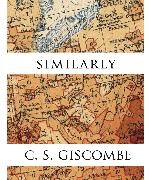Read more
Similarly four complete poetry books and a selection of new poems and sequences—samples the ongoing project of C. S. Giscombe’s long, long song of location and range. In all the work collected here, location is a practice; range is the fact of the serial, the figuring of continuous arrival. The writing speaks to rivers, the souls of city life, animals, the counted and uncounted, the many instances that might indicate “a shape to all that sound,” monstrosity and argument (the latter defined, with a hat-tip to Frankenstein, as “a thing that becomes terrifying to its maker”), and the colors of human migration, these things among others. In the “Cry Me a River” poem, Giscombe writes, "for the sake of argument, say that the shape of a region or of some distinct areas of a city could stand in for memory and that it—the shape is a specific value because it’s apparent and public, and that way achieves an almost nameless contour."
About the author
C. S. Giscombe is a poet, essayist, and professor of English at the University of California, Berkeley. His poetry books include Prairie Style, Two Sections From Practical Geography, Giscome Road, Here, At Large, and Postcards. Giscombe carried a childhood fascination with trains into adulthood, and his work often features railroads: how they shape landscapes and in particular how they formulate “natural boundaries” between neighborhoods. Born and raised on the West Side of Dayton, Ohio, Giscombe recalls in an interview with fellow writer Mark Nowak how the trains and tracks “brush up against people’s houses over here in black Dayton more than anywhere else in town.” Though occasionally esoteric, Giscombe’s work is successful in its ability to formulate unions, reflecting the interconnectedness of language, race, and familial bonds. In addition to being a prolific storyteller, Giscombe is a long-distance cyclist.

